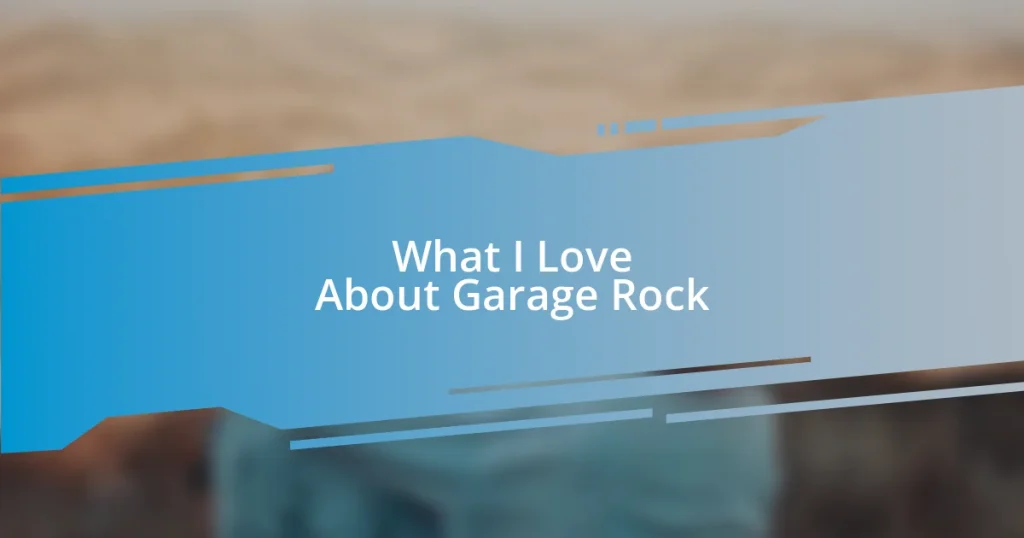Key takeaways:
- Garage rock embodies a raw, unrefined sound characterized by simple chord progressions, rebellious themes, and a DIY ethic, highlighting authenticity and community.
- Notable bands such as The Sonics, The Stooges, and The White Stripes have significantly shaped the genre, each contributing unique sounds and narratives that resonate deeply with listeners.
- The future of garage rock looks promising, with evolving influences from diverse genres and a strong DIY culture, fostering new artists and preserving the community spirit of the genre.
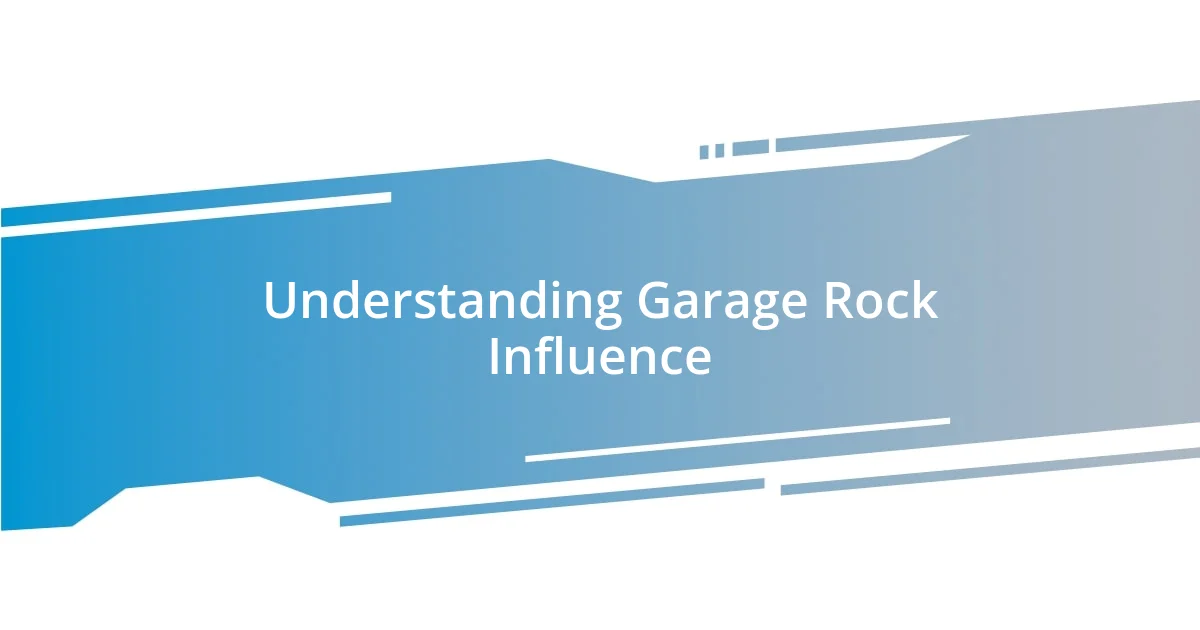
Understanding Garage Rock Influence
Garage rock is more than just a subset of rock music; it’s a raw, unrefined expression of youthful angst and energy. I remember the first time I stumbled upon a garage rock band at a local dive bar. The sound was gritty and unpolished, almost like a musical reflection of the chaotic life I was living at the time. There’s something incredibly liberating about the way these musicians embrace imperfection—don’t you think that adds a layer of authenticity to their work?
The influence of garage rock can be traced back to its roots in the 1960s, where bands like The Sonics and The Stooges created a sound that felt both rebellious and accessible. I can’t help but feel nostalgic when I listen to those tracks; they remind me of late-night jam sessions with friends. The simplicity of the three-chord structure allows anyone with a passion for music to pick up a guitar and join in. Isn’t it amazing how this genre encourages creativity and community?
Even today, modern bands often draw inspiration from garage rock, incorporating its DNA into their music while still exploring new sonic landscapes. When I hear a current band that channels that same raw intensity, I feel a surge of excitement—it’s as if they’re paying homage to a movement that thrives on spontaneity. Isn’t it incredible how a musical style can transcend generations, continuing to inspire and resonate with so many?
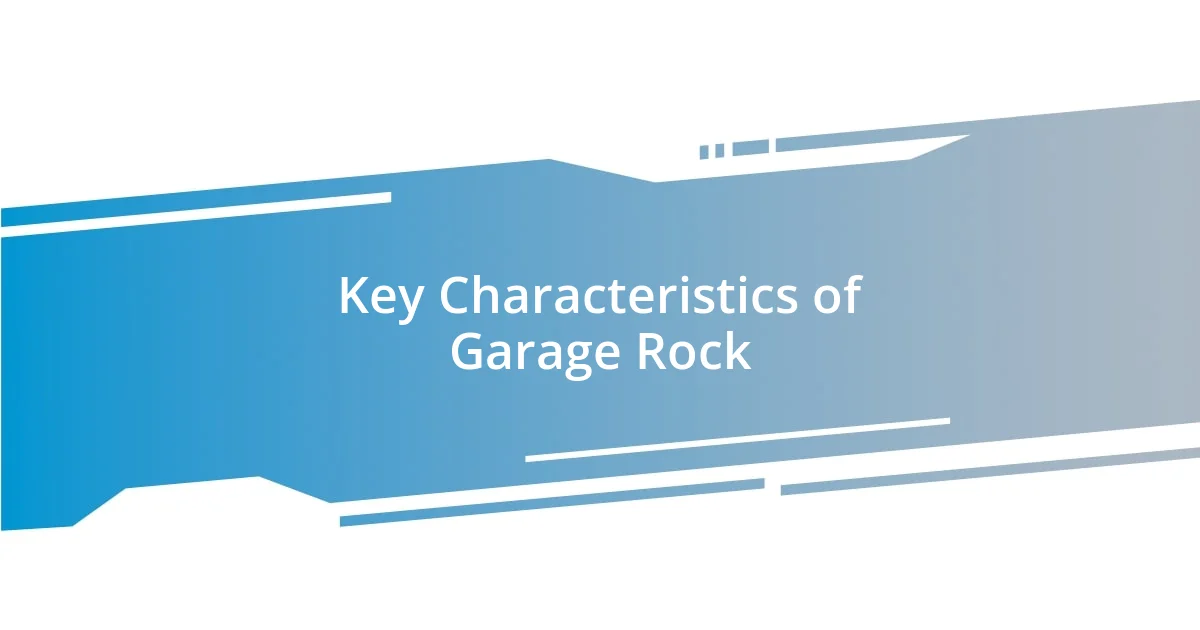
Key Characteristics of Garage Rock
Garage rock is characterized by its raw sound and often rebellious spirit. Each band brings a unique energy, but there’s a commonality in the use of simple chord progressions and catchy melodies. I remember hearing a particularly raucous garage rock track that made me want to jump up and dance; it was as if the music instinctively evoked a sense of freedom. That’s the charm of garage rock—it’s accessible and invites everyone to let loose.
Another hallmark of garage rock is the DIY ethic that permeates the genre. Musicians often record in basements or garages, and the equipment used reflects this approach, resulting in that signature lo-fi sound. I once attended a house show where the band played with a mix of enthusiasm and chaos that made the experience feel intimate and electric. This vibe creates a sense of connection between the audience and performers, something almost palpable that can’t be replicated in polished studio-recorded tracks.
Lastly, the lyrical themes often revolve around teenage angst, love, and rebellion. The words are usually delivered with a gritty honesty that resonates strongly with listeners. I vividly recall discovering lyrics that mirrored my own frustrations growing up, which made me feel a sense of solidarity with the singers. Garage rock holds a mirror to the human experience, embracing authenticity and vulnerability in a way that captivates the heart.
| Characteristic | Description |
|---|---|
| Sound | Raw, unrefined quality with catchy melodies |
| Ethic | DIY approach, often with lo-fi recordings |
| Themes | Teenage angst, love, and rebellion |
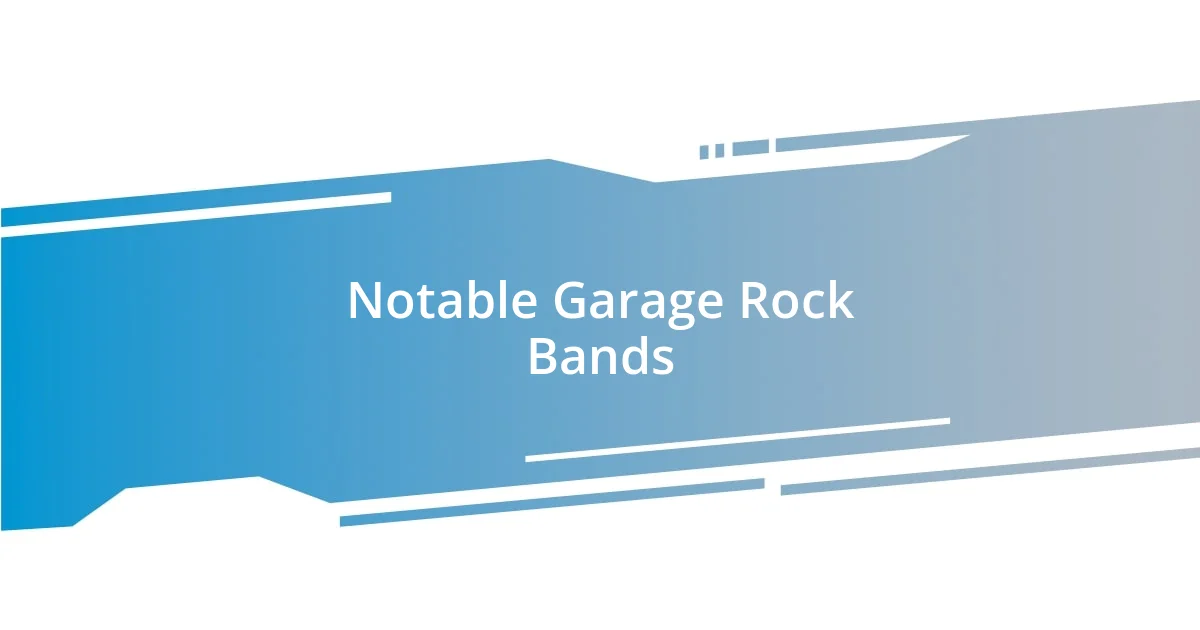
Notable Garage Rock Bands
I’ve had the pleasure of diving into the world of garage rock and discovering some truly iconic bands that embody the spirit of this genre. The raw energy they bring to their music is infectious. For me, hearing a band like The White Stripes instantly transports me back to the grunge-infused days of my youth, where every riff felt like an adrenaline shot straight to my heart. Their stripped-down sound and gritty aesthetic resonate with that rebellious spark that defines garage rock.
Here are some notable bands that have left a significant mark on the garage rock scene:
- The Sonics: Often credited as pioneers of the genre, their album “Here Are the Sonics” set the tone for what garage rock could be.
- The Stooges: With Iggy Pop’s wild antics, they pushed boundaries and redefined rock with a primal intensity.
- The White Stripes: The duo’s lo-fi sound and minimalist style remind me why simplicity often leads to brilliance.
- Thee Oh Sees: Their energetic performances and eclectic sound capture the spirit of garage rock in contemporary music.
- Ty Segall: A modern torchbearer, he blends various rock influences, all while maintaining that unrefined, garage essence.
Each of these bands tells a unique story through their music, and it’s these narratives that connect deeply with listeners like me. Whether it’s the surge of nostalgia felt when a classic tune plays or the excitement of discovering a new band that channels that gritty spirit, the impact of garage rock is visceral and enduring.
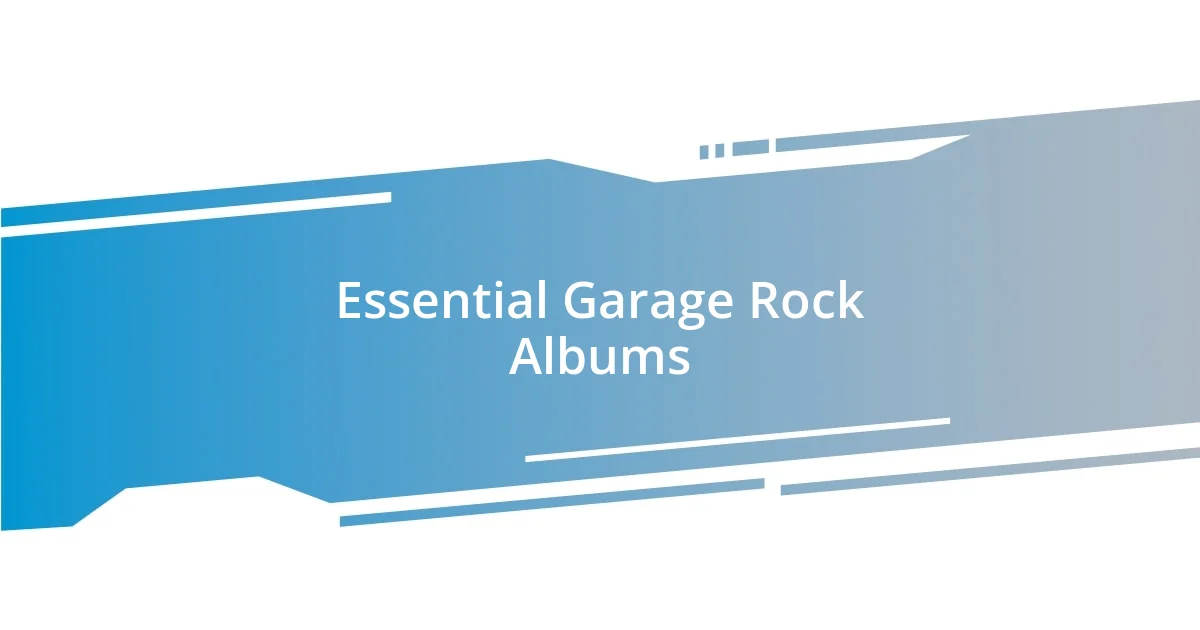
Essential Garage Rock Albums
When it comes to essential garage rock albums, The Sonics’ “Here Are the Sonics” is undeniably a cornerstone. I remember the first time I spun that record; the opening track hit me like a live wire—such raw energy! The album captures a frantic urgency that makes you want to crank up the volume and let loose, as if you were right there in that dingy garage with them.
Then there’s “Fun House” by The Stooges, a profound experience that still jolts me to this day. Listening to Iggy Pop’s relentless vocals feels like being at a wild underground party where you’re not quite sure what’s going to happen next. That chaotic spirit resonates with anyone who’s ever felt out of place or yearned for something more—especially during my teenage years when I was searching for my identity.
Let’s not overlook The White Stripes’ self-titled debut—what a revelation! I distinctly remember finding a battered vinyl copy in a local thrift store, and I had no idea how much it would change my perspective on music. The simplicity of their arrangements creates this stunning depth, making each song an invitation to feel rather than just hear. Have you ever stumbled upon an album that seemed to speak directly to your soul? This was mine, encapsulating that feeling of youthful defiance and discovery perfectly.
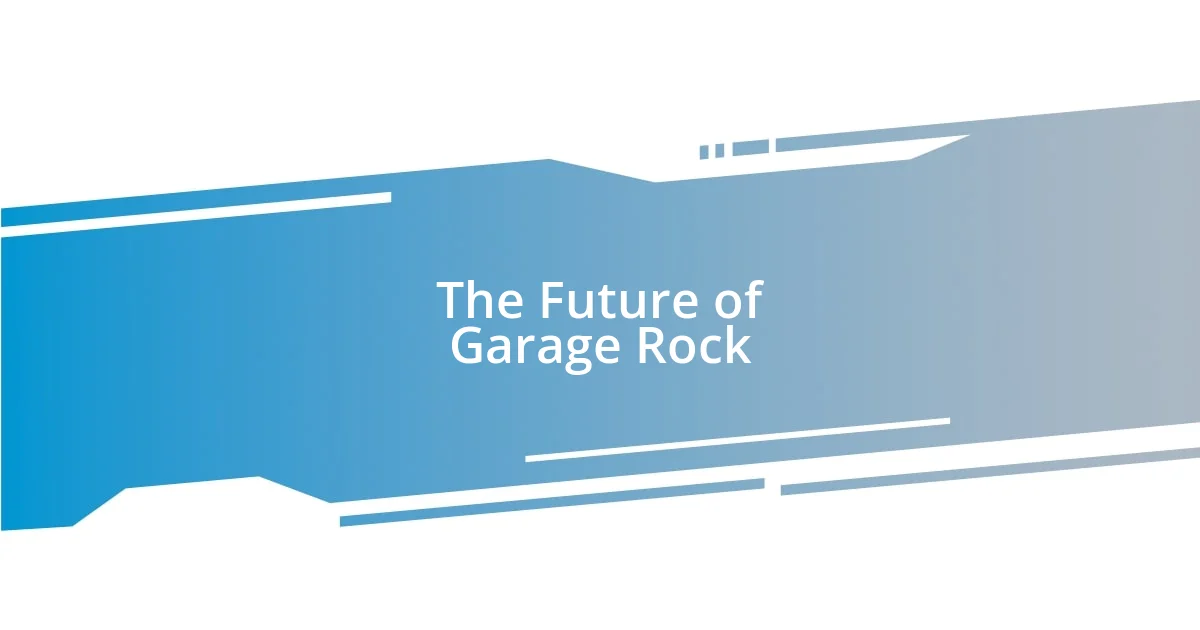
The Future of Garage Rock
As I look to the future of garage rock, I can’t help but feel a sense of excitement. The genre is evolving, absorbing influences from various styles while maintaining that raw, authentic spirit that I love. For instance, if you listen closely, you might notice younger bands like Childish Gambino and Tame Impala incorporating garage rock elements into their sound, blending it with genres like R&B and psychedelic rock. It’s fascinating how these modern artists are reinventing the genre while still paying homage to the roots that inspired them.
What really energizes me is the rise of DIY culture, particularly with platforms like Bandcamp and social media. I remember when I first posted a song I recorded in my garage; the feedback I received was both humbling and motivating. Today’s artists can share their work with the world instantly, breaking down barriers that used to exist. This democratization of music means that we can expect fresh, unique voices in garage rock—who knows, a future legend might just be a click away!
Nostalgia plays a powerful role in the future of garage rock too. I often find myself reminiscing about the underground shows I attended where the air was thick with anticipation. That sense of community is thriving through small venues that showcase local talent. These intimate spaces are becoming breeding grounds for the next generation of garage rockers, giving them a platform to connect with fans like you and me. So, could the future be one where our experiences shape not just the music, but the very community around it? I truly believe that’s where the magic lies.











